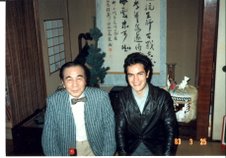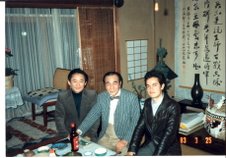String Quartet No. 2, 'Sin Tiempo'
The Koussevitzky commission is now completed. It took me one and
a half years' work – obviously not full-time, since university work only allows
a fraction of my week to be spent on composition - but intensive enough. The
last few months I had to find additional hours in the day, starting in the very
early hours, before the family woke up. Six hours' sleep is not a regime I
thrive on, but it was the only way of achieving results.
The Momenta Quartet were very tactful in not applying pressure, even as time went by and the agreed time for a première - autumn 2013 - approached.
Now, with any luck, they will be able to prepare the new piece over the summer
and release it to the world as scheduled. We do not have a specific performance
date as yet.
This is probably a good time to explain some of the background
and the nature of the piece.
'Sin tiempo' are the first two words of a longer title: Sin
tiempo para las palabras: Teoponte, la otra guerrilla guevarista en Bolivia (“No time for words: the other Guevarist
guerrilla campaign in Bolivia”). That is the title of Gustavo Rodríguez Ostria's monograph on a
guerrilla campaign that took place briefly in 1970 at Teoponte, a mining
district northeast of La Paz.
Teoponte is also the subject of an eponymous opera of mine, premièred at the London International
Opera Festival 1988. Teoponte is not a
full-scale operatic display, but a shorter affair, 35 minutes, for six singers
and an electroacoustic soundtrack. A digression on this older work may be
useful for an understanding of the new piece.
Living as a student in London at the time (1987), I found it
beyond my reach to find a suitable collaborator to write the libretto. This did
not feel like a severe inconvenience, since, as I researched the topic, I was
developing a clear conception of how I wanted to treat the story. Thus came about as a natural development for me to write my
own libretto, based as much as was feasible on the historical facts of 1970 - remembered from childhood and more freshly gleaned from the pages of El
Diario, La Paz's conservative daily. Miraculously, many of its issues of the relevant period were available on microfilm at London's Colindale Library.
Contemporary sources were scarce. I contacted Isabel Hilton, then
Latin American correspondent at The Independent. She was very helpful
and pointed me in the direction of James Dunkerley, the author of a
well-researched book on Bolivian politics in the relevant period, Rebellion
in the Veins: Political Struggle in Bolivia 1952-1982. One paragraph in the
book relates to the episode, but I inferred that Dunkerley knew more, so
I sought him out. Dunkerley, too, was very helpful. He received me at
his office in Queen Mary University of London, with a surprising treat: he
opened a packet of Casino, a strong brand of dark tobacco much in favour among
Bolivian students and intellectuals. I was not a smoker, but I could
neither decline the hospitality nor resist a nostalgic taste of earlier times.
Dunkerley explained his take on Teoponte, opening my eyes to aspects I had only
been half-aware of, such as, for example, the influence of Liberation Theology
on the catholic contingent among the insurrectionists. He kindly lent me his
copy of Teoponte, una experiencia guerrillera, a succinct testimonial by
the Brazilian priest Hugo Assmann, which I used intensively and returned to
Dunkerley by post.
Memories, press, two conversations, one book. Based on these
exiguous sources I formed a conception and fashioned a libretto that was
simple, pithy and essentially distilled from contemporary speeches, reports and
communiques.
Teoponte the opera was performed at the Bloomsbury
Theatre, as part of the 1988 London International Opera Festival. The
performers were Innererklang Music Theatre, directed by Séan
Doran. The reception seemed enthusiastic on the night, but appeared mixed in the
press. It was instructive to hear appraisals from colleagues who had attended,
including one from Trevor Wishart - whose Anticredos Innererklang had
performed in the same programme - who opined that Teoponte showed an
excessive closeness of its composer to its subject.
Wishart’s comment was perceptive, but I am not convinced that it was
possible to form an informed opinion on the basis of that performance. I cannot
fault Séan
Doran or any member of his team; they worked with commitment and artistry in
difficult circumstances. It is the circumstances I find fault with: a tight
timescale and a breach of understanding between Innererklang and me as to the
role of the tape part. They had expected occasional electroacoustic interventions,
whereas I presented them with a soundtrack to which they were expected to
synchronise from beginning to end.
It had not been my intention to surprise; I simply had not
considered any other possibility than a fully developed tape part as a substitute
for the orchestra, that is, as a continuous stream of sound, not only
supporting and punctuating what the voices did, but also carrying the flow of
expression whether the voices were singing or silent. And, it would be
disingenuous not to mention it, I delivered the completed tape part to the
performers two weeks prior to the première, that is, far too late for them to
assimilate it properly.
This is tempting, but I must postpone a detailed description of Teoponte
the opera. I will only say that it is set in a folk club, it is in four
scenes or tableaux, and its structure – both locally and overall –
is based on four chords which happen to be quite common in Bolivian folk music.
I will also say that, back in my very young days as a folk
musician in Cochabamba, I knew Benjo Cruz, a charismatic solo singer who was a
frequent visitor at the folk club where most of my gigs took place, Peña Ollantay. I
greatly admired the intensity if his performances, charged with the energy of
his political convictions. I did not fully understand these at the age of
eleven, but I was aware, like any Bolivian of any age was, of an ideological
struggle between the establishment, broadly associated with right-wing military
dictatorships, and a younger front who opposed it and wanted change. I had seen
the demos and the riots, I had smelt the tear gas, and I had heard the shots.
Both my parents were journalists and news were always table conversation. I was
certainly aware of Che Guevara and of the entrenched polarisation in public opinion
after his death.
Benjo Cruz sang protest songs. He would first work the crowd with
some lively traditional repertoire, and then he would hit them with a thinly
veiled political message in the form of a song or a recitation. The folk club –
Peña
Ollantay – was a popular weekend entertainment, and it was well
attended by a cross-section of the population, including the well-heeled. Benjo
would not temper his message if there was a public official or dignitary in the
audience. This added to the electricity in the atmosphere of his performances,
and yet I never witnessed any unpleasantness.
What could not escape my or anybody’s notice was that a new guerrilla
campaign had begun. ELN (Ejército de Liberación Nacional) had made good a
promise made on the death of Che Guevara: volveremos
a las montañas (we shall
return to the mountains) and had unleashed a new insurrection against the
military regime. Among the fighting rebels was Benjo Cruz. Over the next few
months, either in combat or in summary executions, the military killed 59 out
of the 67 rebels. Benjo was one of the casualties.
The story of my attachment to this topic is long and entangled. I
tell it in greater detail elsewhere, and will tell it in even greater
detail when I have the chance.
For today’s purposes, I will say that Gustavo Rodríguez
Ostria’s
book opened my eyes to many facts and ideas I had only superficially known, or
intuited, and many other facts and ideas which I had not known. If this book
had been in existence in 1987, Teoponte the
opera would have been very different indeed.
Hence the need to write more about Teoponte. My business is
unfinished. In 2012 I completed Souvenir
de Teoponte for double bass and piano, a piece where I return to some of
the opera’s material and I test its potential in a new medium. As well
as the harmonic and structural conception, there was the conversion of
electroacoustic sounds into double bass and piano sounds to explore. James
Rapport and Eduard Lanner, and then James Rapport and Linus Kohlberg, have done
committed work with this piece in Vienna.
Now I present my Second String Quartet, ‘Sin tiempo’.
It too revisits some structural and thematic material from the opera, even
where it is only in passing evocation. It engages with the world of turmoil, commitment,
strife and self-sacrifice for an ideal that characterised that moment in
history. It brings the past to the present and it does so in several layers. It
pays homage to some of those fighters – Benjo Cruz in particular –
and to Gustavo Rodríguez Ostria for his enormous achievement. It also celebrates
the artistry of the Momenta Quartet, who I know will do a superb job with the
work.


